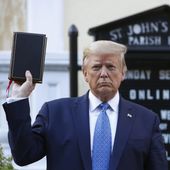President Trump escalated his battle with pro football players protesting the national anthem by urging the government Tuesday to end use of tax-exempt municipal bonds used to build or renovate National Football League stadiums.
Hours later, the NFL appeared to acquiesce. Commissioner Roger Goodell released a letter saying the league’s position is that “everyone should stand.”
It remains to be seen how the league follows through on that stance, but it suggests the NFL is feeling the heat from a president who has spent the better part of a month blasting the anthem protests and turning the issue into a major dividing line in American society.
“Why is the NFL getting massive tax breaks while at the same time disrespecting our Anthem, Flag and Country? Change tax law!” Mr. Trump wrote Tuesday morning on Twitter.
He also took aim at ESPN, saying the network — which airs “Monday Night Football” — is struggling for viewers while employing broadcasters who have defended the players’ kneel-down protests.
While the president didn’t indicate exactly what he had in mind, White House press secretary Sarah Huckabee Sanders said Mr. Trump was referring to “billions of taxpayer dollars” that have subsidized the construction of professional sports stadiums.
“If this industry is going to use money from American taxpayers to build the very fields they play on, is it really too much to ask that they show respect for the American flag at the beginning of the game?” Mrs. Sanders said.
Mr. Goodell released his letter to team presidents Tuesday afternoon saying the league needs to “move past this controversy.”
“Like many of our fans, we believe that everyone should stand for the National Anthem. It is an important moment in our game,” he wrote.
He said players looking for a platform for their messages could be accommodated some other way and that it would be discussed at a meeting later this month.
Mr. Trump’s war on the league appeared to be having an effect, according to polling.
While surveys show Americans are unhappy with the way the president has handled the matter, they don’t like the players’ protests.
A Morning Consult survey late last month found views of the NFL among Trump supporters had turned decidedly negative and the league’s brand favorability was also dropping.
Meanwhile, a Yahoo Finance poll found as many 80 percent of respondents said they plan to watch less football on television. The same poll found that 53 percent are more supportive of Mr. Trump since he remarked that the protests were disrespectful to the U.S. flag and military.
This weekend’s slate of games gave Mr. Trump another chance to pounce. On Monday, he praised Dallas Cowboys owner Jerry Jones for saying he would bench players who he thought were “disrespecting the flag.”
He followed up Tuesday with his blast at ESPN and his threat of stadium taxes.
U.S. cities typically finance the repair or construction of stadiums through the sale of municipal bonds that are exempt from federal taxes. In total, federal taxpayers have helped underwrite some $13 billion in bonds for stadiums across all sports since 2000, according to a Brookings Institution study.
Brookings estimated that the federal government has lost as much as $3.7 billion in tax revenue on the bonds, exceeding the $3.2 billion in savings they created for stadium owners.
President Obama sought to end the use of tax-exempt bonds to build stadiums in 2015, but Congress never considered his plan.
Sens. Cory A. Booker, New Jersey Democrat, and James Lankford, Oklahoma Republican, picked up the issue this year by introducing legislation to end the use of bonds to finance stadiums.
Analysts differ on whether the cities would try to fight any effort by the Trump administration to end the practice. The interaction of federal legislation with state and municipal powers could present legal headaches for the president.
“Public financing for sports facilities is a complicated topic in that it can involve spending, taxes and bonds and cut across different areas of law at municipal, state and federal levels,” he said. “Any potential changes related to federal laws should be viewed in this broader context.”
However, Andrew Zimbalist, who teaches sports economics at Smith College, said the cities might avoid battling the administration because they would be unlikely to gain traction among the public.
“The states would look stupid,” he said. “There are more important battles to fight, and they can just negotiate a better deal with the team.”
One potential obstacle to Mr. Trump’s battle is that any proposed legislation would affect all stadiums, not just those used by the NFL.
“If the president wants to specifically punish the NFL, I am highly dubious he could get support for such a bill,” said Philip Hackney, a tax law professor at Louisiana State University. “It would have to be applied broadly.”
The NFL was a tax-exempt nonprofit until 2015, when the league voluntarily ended that status under pressure from Capitol Hill. The break had been worth about $10 million a year, according to Citizens for Tax Justice.
The NFL was considered a nonprofit because it distributes profits evenly to all 32 teams. Each team is required to pay taxes on that distribution.
• Jeff Mordock can be reached at jmordock@washingtontimes.com.




Please read our comment policy before commenting.